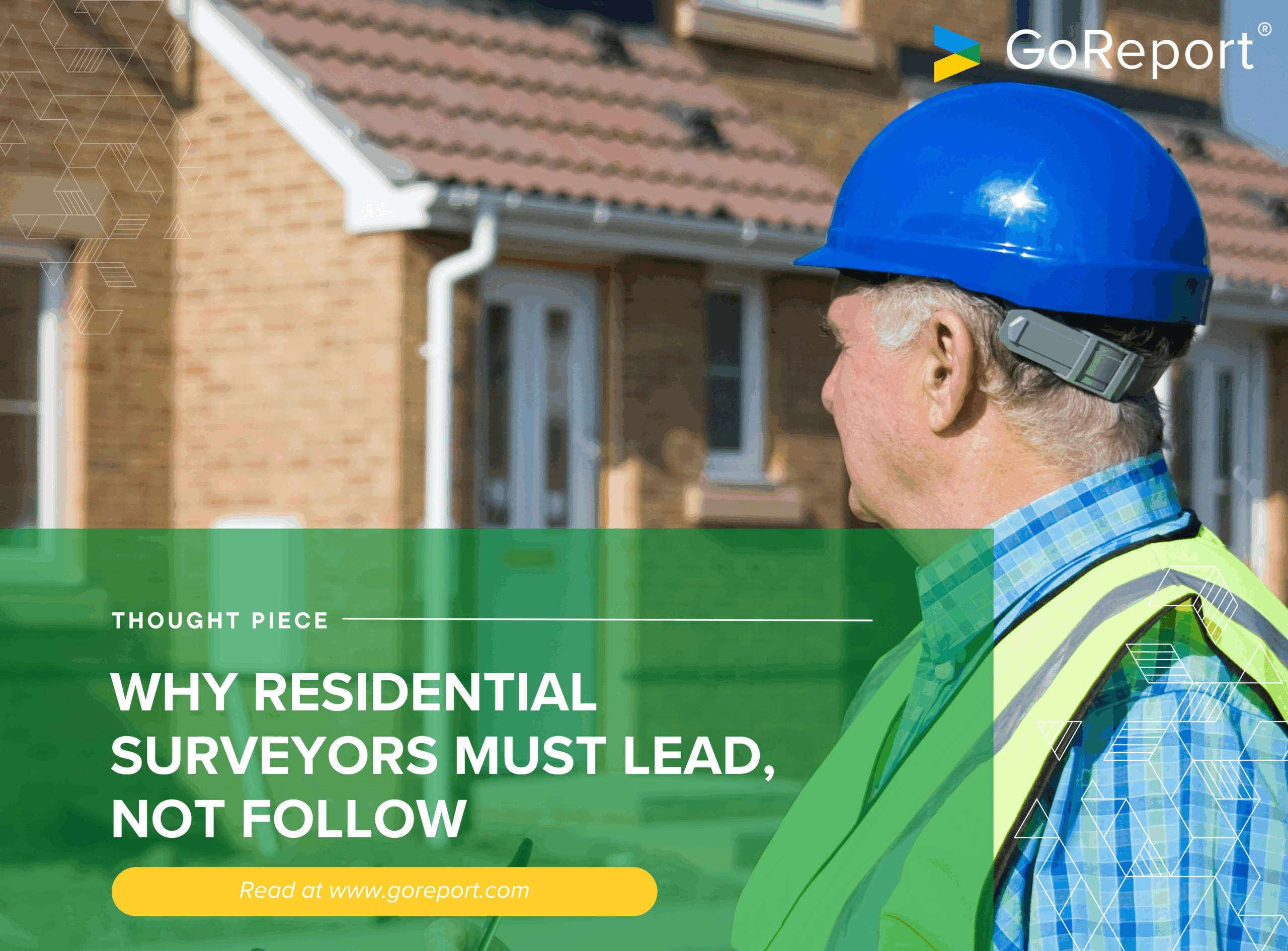Why Residential Surveyors Must Lead, Not Follow

There’s a quiet revolution underway in residential surveying, and many haven’t noticed.
Between sweeping policy reform, decarbonisation deadlines, and a housing crisis that’s shifting from chronic to acute, the role of the residential surveyor is no longer just about inspections and reports. It’s about foresight. Influence. Strategic value. Yet, many in the profession are still operating like we’re in 2015; head down, shoulders hunched, playing it safe while the ground shifts beneath us.
Now, this isn’t to say the industry needs to panic, but rather stay increasingly present. While everyone talks about delivery targets, legislation, and digital transformation, there’s one thing no government programme or AI tool can replicate: professional judgement. The kind that’s been earned on the ground, tested through experience, and sharpened by watching what happens when systems break and people fall through the cracks.
Something’s shifting, and if you were at the 2025 RICS Residential Property Conference, you likely felt it too. Here’s what’s covered in the article:
- Why residential surveyors must stop waiting for clarity and start shaping it
- How major housing ambitions and policy shifts are reshaping the rules of engagement
- The retrofit reckoning and how surveyors can avoid being sidelined
- Valuation under pressure: new standards, evolving expectations, and the AI elephant
- Practical insights into decency, disclosure, and data that clients actually want
- The invisible toll of the job and why peer-led support is no longer optional
Are we planning for growth, or just hoping it works out?
There’s no shortage of ambition when it comes to addressing the housing crisis, but whether or not it comes to fruition is another question entirely. Damian Cross FRICS FCIOB, representing the Greater Manchester Combined Authority (GMCA), presented a clear vision at the Residential Property Conference: 75,000 new homes to be delivered across Greater Manchester by the end of the current parliamentary term, including 10,000 that are both truly affordable and net zero. But, as Cross cautioned, ambition alone doesn’t build homes. That scale of delivery will only be achieved if underlying issues, such as development viability, procurement bottlenecks, land release, and fragmented local plan coordination, are confronted head-on.
GMCA’s strategy, supported by initiatives like the Greater Manchester Land Commission, the £285 million brownfield funding programme, and the Places for Everyone spatial framework, is comprehensive on paper. Yet many of these programmes will falter without the early input of professionals who understand land, condition, and risk in practical terms.
Surveyors are often closest to the ground truth, whether it’s viability assumptions, site constraints, or supply chain concerns, but are still too frequently brought in after the key strategic decisions have been made. Cross’s presentation underscored the need for a mindset shift across planning, construction, and leadership: surveyors shouldn’t just be present at the planning table, they should be leading parts of the discussion. When their insight shapes early-stage decisions around land quality, asset condition, and long-term value, the result is more deliverable schemes and fewer costly delays.
As local authorities, developers, and regional bodies gear up for large-scale housing growth, the question isn’t whether surveyors can support these ambitions. It’s whether the system is listening early enough for their expertise to truly make an impact.
“Decent homes” can’t be just a standard
Poor housing is costing the UK an estimated £18.5 billion a year, and more than 128,000 households are now in temporary accommodation with the figure climbing. The definition of a “decent home” is shifting from both a regulatory line in the sand and a lived expectation from tenants, policymakers, and the wider public.
The forthcoming Decent Homes Standard 2 reflects this evolution, placing a sharper focus on issues like damp, mould, and minimum energy efficiency. It marks a positive step forward, but as Jennie Chilton of Addleshaw Goddard pointed out, even the most robust framework depends on how well it’s applied on the ground and is only as effective as those delivering it.
That’s where surveyors come in. Standards can set the bar, but only surveyors can raise it. RICS’ move to professionalise stock condition surveys is a step forward, but meaningful change requires more than form-filling and demands consistent, lifecycle-focused thinking across contractors, housing providers, and inspection methodologies. It means recognising that decency isn’t something to be signed off once, but a condition to be maintained, measured, and defended.
Treating decency as an ongoing commitment and not a one-time check requires joined-up thinking across housing associations, contractors, and local authorities. When surveyors are given the platform to lead on condition, quality, and long-term housing health, both the policy and housing standards for residents are sure to improve.
Retrofit: If you’re not ready, you’re already behind
Retrofitting is no longer a future aspiration – it’s happening now, at scale, and gaining momentum across the UK housing sector. As Professor Richard Fitton FRICS of Energy House Labs highlighted at the Residential Property Conference, the shift toward net-zero homes is now beyond hypothetical; it’s being tested, measured, and refined in real time at facilities like Energy House 2.0. The findings are providing real-world evidence of what effective, high-performing retrofit actually requires on the ground.
The RICS Residential Retrofit Standard marks a turning point. By clearly defining what competent, responsible retrofit work should involve (from condition assessment and occupancy analysis to ventilation, energy flow, and the legacy of past interventions) it gives surveyors a solid foundation to lead with confidence.
As public and private investment continues to scale, the sector will increasingly rely on professionals who can bridge the gap between energy strategy and on-site reality. Surveyors are uniquely placed to do just that, bringing together technical insight, building knowledge, and trusted guidance. When done well, retrofit improves lives, reduces energy bills, and protects long-term housing quality. Surveyors will be central to making that promise real.
Is AI coming for us, or can it help us get home earlier?
By now, it’s clear that AI is here to stay, and RICS is taking it seriously. The launch of the new Responsible Use of Artificial Intelligence – 1st Edition standard is an important step toward defining how tech and professional judgement can coexist. It also revealed something else: many surveyors are still unsure how to approach AI in a way that’s both ethical and effective.
Used properly, AI can be a powerful ally. It can pre-populate templated reports, flag anomalies in captured data, and identify inconsistencies across inspection history. Done right, it improves accuracy, not just speed, freeing up surveyors to focus on what matters most: interpreting findings, making informed calls, and advising clients with confidence.
That said, the temptation to use AI as a shortcut is real. Pursuing efficiency without safeguards risks flattening nuance and overlooking context, because surveyors don’t just report, they interpret. They spot what isn’t obvious. They understand how small details impact long-term value and risk. AI can support that process, but it certainly can’t replicate it.
When implemented thoughtfully, technology has the potential to raise the standard, not lower it. When you keep the human element intact, AI can assist in removing the noise, sharpening focus, and giving surveyors more time to apply the kind of insight that algorithms can’t. The opportunity here isn’t to fight against AI, but to lead its use in a way that genuinely improves the quality and clarity of professional reporting.
New regulations are testing old habits
The residential sector is facing a regulatory storm, from leasehold reform and the Renters’ Rights Bill to material information rules and valuation updates. Sam Lees, Nigel Sellars, and the RICS regulation team confirmed that consultations are underway to expand the Home Survey Standard, introduce a possible regulatory scheme for surveyors (similar to VRS), and address rising complaints and inconsistency.
Of particular interest is the concept of EVRMP (Estimated Value subject to a Restricted Marketing Period), a subtle evolution in how valuations are framed. This requires surveyors to think contextually, to weigh urgency and local performance, and to communicate difficult truths with care. Similarly, leasehold changes – from the banning of ground rents to the rise of commonhold – will reshape the types of advice clients need. Those who stay ahead of this curve will be able to offer clarity in an increasingly grey legal environment. Those who don’t may find their relevance fading.
Burnout is not a badge of honour
Amid all the technical evolution, one reality often goes unspoken: the emotional toll of the job. Faye Smith and Melissa Gough-Rundle from LionHeart made this clear with real-life stories of surveyors facing mental health crises, bereavement, burnout, legal disputes, and financial collapse. These aren’t edge cases, they’re happening weekly.
LionHeart has seen a 104% increase in support demand since 2018. And yet, only 16% of surveyors donated via their RICS subs in 2024/25. That gap says something uncomfortable: we are a profession that quietly supports each other in theory, but not always in practice.
The emotional load of entering unsafe homes, delivering bad news to vulnerable clients, or shouldering legal liability is not trivial. It’s cumulative. If we want to maintain high standards, we must also support the people upholding them. It’s time we treated wellbeing not as a ‘soft’ issue, but as infrastructure.
So, what do we do now?
The future of housing is more than just political; It’s practical, and surveyors are the ones holding the clipboard. Surveyors need to reframe their identity, not as passive reporters, but as active interpreters. Professionals who don’t just inspect buildings, but shape decisions. Who don’t just follow standards, but refine them. Who are as comfortable advising on viability as they are on ventilation.
So, make sure to stand up and lead. Not because you must, but because you’re the best positioned to do so.
GoReport is designed for surveyors who want to focus on judgement, not formatting. It streamlines digital data capture, cuts admin, and helps you deliver cleaner, clearer reports faster. If the job’s getting heavier, the tools you use shouldn’t be. Get in touch for a free demo.







